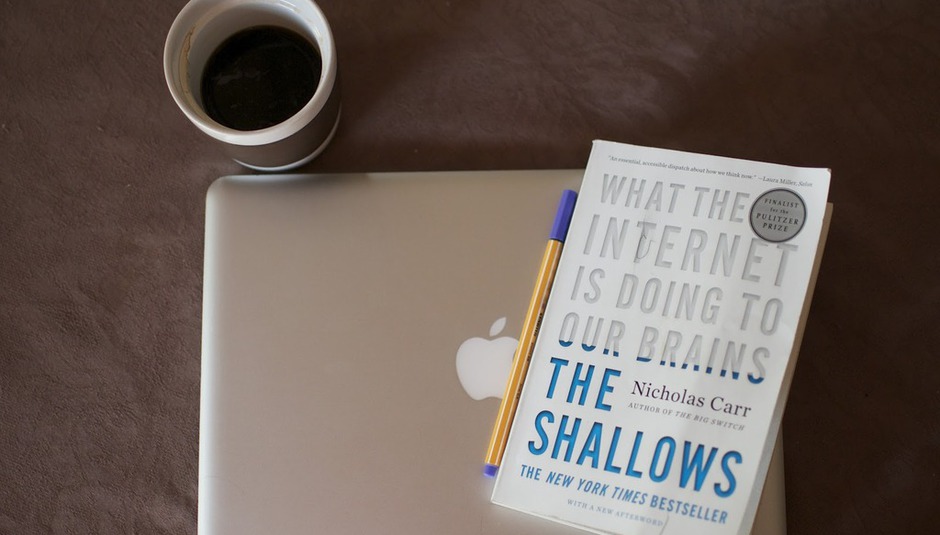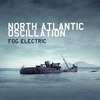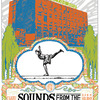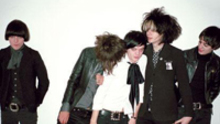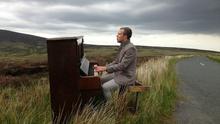Being a man prone to leaving endless notes, half-ideas and thoughts on paper strewn around my house, I’ve never really given much thought to the physically written word being obsolete. At Bradford’s National Media Museum, though, that implication is clear; a notepad, a diary and a post card are enshrined in a small glass cabinet in a small corner, a sign asking “How did we used to communicate?” sitting next to them.
Whilst that particular exhibit in the museum’s internet exhibition 'Life Online' is perhaps a little glib on the curators’ part, it does reinforce the sense that technological developments have effectively snuck up and overtaken a humanity that remains largely unaware or unconcerned by its happening. It’s one of the many aspects of man’s evolving relationship with machine that Leeds four-piece I Like Trains reflect upon on their excellent third album The Shallows. Inspired in part by the Nicholas Carr book of the same name, The Shallows – as the group’s albums in the past have done – approaches the subject in hand from a variety of different view points. Their sound, meanwhile, has shifted from the more full-sounding guitar bombast of old to a sleeker, more streamlined approach that, in its own way, reflects man’s submergence by technology, electronic patters and rumbles doing battle with vocalist and lyricist David Martin’s now accustomed baritone delivery.
Though characters do still lurk in the songs, they’re far from as pronounced as those that I Like Trains became known for upon their 2006 breakthrough single ‘Terra Nova’ – revolving around Captain Scott’s doomed attempt to reach the centre of the Arctic in 1912 – and subsequent ‘Progress Reform’ EP and debut LP Elegies To Lessons Learnt. This LP isn’t future prophesising either, as on 2010’s He Who Saw The Deep; The Shallows takes place in the here and now, and reveals the band at their most open yet. Following a walk around the museum (clips of which you can see just below courtesy of Plastic Zoo who came across from Manchester with me for the day,) DiS sat down for a chat with Martin and drummer Simon Fogal about the new album.
---
Your last release, He Who Saw The Deep in 2010, was put out via Pledge Music. This time around, I Like Records has been set up and the whole process has seemed a littler surer. In reality, though, how different has it been this time round?
David Martin: I don’t know that it’s been a million miles away from what we did before. We used Pledge to set us up and the last record went well enough that we were receiving money in for record sales that we never had when we were with a record label. We weren’t starting from ground zero for this one, so to speak. At the same time we weren’t able to just go out and release it, we basically needed to ask our fans to help us by pre-ordering, so we’ve done that and our fans have stuck with us once again. I guess with Pledge that was the first time we’ve tested the waters in that respect and we were really blown away by it, so this time it’s still encouraging to know that there’s still enough people out there to do this for us. Without hearing anything of this new LP they’ve blindly put their faith in us.
Simon Fogal: We basically used a Pledge model and applied it to something else.
There’s a been a lot of discussion over the relative merits of Pledge, whilst some view it as a legitimate way to fund albums, there are others concerned that some artists use it as a way to take advantage of their fans. How comfortable were you with doing it?
DM: It’s a massive discussion and people will have their own opinions on it. All we can say really is that it was massively successful for us and our fans seemed to really appreciate being able to have that interaction with us. We were very keen to make sure that the pledges that we were offering represented some value for money.
What sort of packages did you offer?
SF: One of the things we did was a web gig.
DM: That was really good because there were people in countries we’d never been to that’d never seen us live so it was good to play for them.
SF: For half an hour we basically had a chat with them and played three or four songs, which they got to choose. We offered a game of chess which everyone seemed to pick up on.
DM: Scrabble, not chess
SF: That’s it, which was useful because none of us can play chess very well! Whereas Alistair [Bowis, bassist] is quite good at Scrabble. That was a bit of a joke one really but it seemed to be really popular.
DM: Most people just used it to pre-order the record though, so for the new one we’ve pretty much brought it down to just that option.
Did the confidence gained from the success of the last album help to bring the new album around a bit quicker? The gap between them has been comparatively short this time round compared to albums one and two.
SF: We never really planned it to be honest! We just got into a groove of writing.
DM: Well, if we’d just left things open we’d have taken a long time again, once we got writing we just said “this is when the record’s going to be finished.”
SF: We set time scales which we’ve never really done before.
DM: It forced us to work in a completely different way. We went into pre-production with Richard Formby with lots of things up in the air. Lyrics weren’t finished, arrangements weren’t done… Before, we sort of knew how the record was going to sound and this time we didn’t, which was exciting in itself. There were a few open ends on the last record and we’ve done it with B-sides, but to do an entire record like that was different.
SF: I had a few sleepless nights on it before going to Wales to record it.
DM: I think the big difference was having Richard on board for production.
I was going to ask, how did that come about and how did it change the processes of the past when it came to the recording?
DM: For me it made me much more relaxed about the whole thing, there were big elements that we let Richard worry about whereas in the past we’ve always been very hands-on – or at least I have! I find it very difficult to leave it completely alone so I was still looking over his shoulder all the time.
SF: We met him at Live At Leeds last year and had a quick chat. He then came to a gig at the Brudenell in Leeds and was keen.
DM: It was important for us that he was a fan, or at least interested enough to pursue us. We’ve always self-produced the records and so it was a big step to let someone else into that. It just got us out of a certain way of working.
The results come across audibly, there’s a much cleaner feel to this record, a lot more space between the elements – was that a conscious thing?
DM: Very much so. I think that originated from us, but it was Richard’s works with the Wild Beasts records where they’re full of clean lines and open spaces that got us into that mindset ourselves while writing. On our last records we’d fill every space we could with noise and layer things, this time we were keen to try and strip that out. That’s what excites him as well, he came from a similar place to us in that he was making big noisy rock records as a musician and now it’s more about the rhythms and the space between that.
What brought that on from your side?
DM: What we were listening to; we’ve been listening to more electronic music and became a complete sucker for analogue and arpeggiated sounds and synths, and we approached sounds like those completely fresh. I’ve played guitar as long as I can remember, but synthesizers aren’t a natural thing to me so it was a chance to see how I could interact with that technology.
SF: From the drumming point of view of the new record, it’s more motorik.
Did you find it a challenge to rein yourself into that disciplined style of drumming?
SF: I enjoyed it to be honest. We don’t normally record to a click in the studio, this time we did and it was much easier than I thought actually.
DM: We normally let it ebb and flow naturally and this album was on a grid of sorts, which was what we were looking for.
It’s reflective of the content matter as well I suppose, there’s a rigidity that acts as the machines of which you’re describing man’s relationship with. The album’s about our relations with technology, could you be more specific on that?
DM: I was looking at the psychological impact of using technology and being online on an everyday basis. It feels like all this technology was supposed to make things easier and save time but it now almost owns us, we’re on it every day all day so it’s no longer saving us time. It’s a really big thing and it feels like it’s almost happened without anyone noticing. People are only really starting to reflect on it now.
Musically The Shallows is cold and calculated, reflective of programmed machinery. The lyrics themselves though are more expansive and refer to mythical characters and God-figures.
DM: Old habits die hard!
Was it an intention to juxtapose science and more abstract beliefs?
DM: Yeah, I guess so. It would’ve been a pretty dry record if I’d stuck to 0s and 1s! There needs to be that human element … I guess all through our writing there’s a theme of history repeating itself and it has done again in that our tools have always shaped us, whether that’s the printing press, or film; the internet and it’s impact technologically is simply the next one to shape us.
What struck me, going way back to [2006 EP track] ‘Terra Nova’ and its tale of Captain Scott, was this once great admiration for explorers and adventurers seems to have now descended into a fear that people have uncovered too much.
DM: [Laughs] I dunno, those old times maybe were better … they probably weren’t, but it’s more a case of rose-tinted spectacles I guess. We can’t stop it though; one thing I’ve always tried to make clear is that I’m never preaching a way of living, I’m just documenting where we’re at and how I feel about it. It is what it is.
You recently had a son too, has that changed your perception on record from a more stand offish observer – in playing historical characters, for example - to a greater realisation that these issues are now more real to you?
DM: It’s been written since I’ve known I was going to become a Dad. I didn’t set out and intend that to be part of it, but it’s quite difficult to escape it so I guess that makes me look forwards much more than it does looking at history. Of course I worry about me being able to do the right thing for him and bringing him up in the right way; being connected all the time is going to be such a big draw for him, but I’d like him to see that there’s more to life than that. I think, as you say, we set out to make out this mechanical record about technology, but at the end of the day I sit back and think that it’s possibly more personal to me than any of our records.
Lyrically, it does feel like you’re stripping back layers in a way, you’ve gone from playing characters towards a more personal perspective with each record. Have you found it difficult going from a more detached approach, in taking the part of a persona, to being simply yourself?
DM: I guess so. There are a few songs where I’m still in character. I think if I’d had a bit more time to think about it then maybe I would have taken more of myself out, but with the timescale we set ourselves I didn’t really have time to censor myself – which was perhaps a good thing! It made it more direct and spontaneous.
Looking at the tracks in more details, ‘Mnemosyne’ is based on a tale from Greek mythology; what made you apply that story to this concept?
DM: Well Mnemosyne is the Greek goddess of memory, and one of the things that our reliance on technology has done is to have caused us to become poorer at remembering things. We carry Google around in our pockets instead. The brain is a muscle and you need to exercise parts of it to be strong and we don’t exercise that part any more, so that led me onto memory and led me onto the Greek goddess. It just became obvious that I should write that song, especially when you factor into it that she was the mother of the muses and, so, without the muses, artists and musicians wouldn’t be inspired. Writing it made me realise that my use of technology has potentially made me less creative; I probably spend more time on the internet than I should do, rather than spending time being more creative elsewhere. It seemed to fit in really well as a theme.
Do you consider that people’s increased reliance on being connected is breaking down communities? Or is it simply shifting them to a different non-physical place?
DM: Well, on the one hand there’s the break down of even just your family unit, with people in different rooms and in their own little world, but then you have a global community that can come together, and there’s a positive and a negative to that. Without the internet our band wouldn’t really be where we were, so I can’t really complain too much that people in Australia and south east Asia can listen to our music and interact with us, so it’s a positive from a musician’s point of view. I’m not saying you should become a technophobe, but you should consider what you’re doing and how it’s affecting you and your community.
Is that what the last two tracks ‘We Used To Talk’ and ‘In Tongues’ concern?
DM: Absolutely, and it’s filtered through something else which I don’t really want to reveal. ‘In Tongues’ was one of the first songs we wrote and then it was the last one to finish the LP, which is what we’ve always done.
When it came to writing was there any thought to the previous record? For me they could sit side-by-side in that ‘He Who Saw The Deep’ last one looked at the environmental world and this one looks at the man-made one.
DM: I think that all our records can, actually. They certainly reference each other in the lyrics, I don’t know if that’s me being lazy or clever – or a bit of both! They’re all part of a suite; I guess the worry is that I don’t know where the next one goes to keep doing that.
SF: We had our past record in Elegies To Lessons Learnt which was about learning from history and, then our future record, which you can’t suss out without learning from the past.
And this one is set most strongly in the present?
DM: Definitely, looking forwards but set in the present day. I don’t want to reveal too much more than that though.
SF: He won’t even give the lyrics away to us! We have to guess.
DM: Ok, well basically the title of the record comes from a book of the same name by Nicholas Carr. I didn’t take loads from it but it felt like the right title. It’s basically referencing that we occupy The Shallows of thought, we don’t think deeply because we’re constantly distracted.
You say this album’s about a love/hate relationship with technology. Is there positivity in this record at all?
DM: [Laughs] I don’t do positivity.
SF: [Laughs] You can dance to it though! If you choose to.
DM: That was one of the things we set out to do, make an I Like Trains record you could dance to; you wouldn’t necessarily want to –but you can. From the stuff we were listening to it came out like that.
You say you’re not preaching, so what viewpoint do the lyrics come from? Are you predicting a worse case scenario or are these words what you think are an accurate prophecy?
DM: I guess there is an element of dramatic effect. I’ve always tried to balance lyrics out with different viewpoints, and that helps if I’m singing in character, I guess, because I can sing something that I don’t necessarily agree with - I’ve got this get out clause!
And how is this all going to come out live?
DM: It’s going to be a challenge! It became like troubleshooting; we’re through the worst of it I think.
SF: I’ve been given all sorts of new equipment that I’m having to master alongside my drums.
DM: We had all these synthesizers and drum pads in our rehearsal room and for our first “practice” we didn’t really play anything, we just sort of looked at it and spent most of the time trying to just get them working. We’ve never wanted to do backing tracks and so we’ve gone to quite large lengths to ensure we don’t have to rely on that. I can never quite enjoy a band as much if I suss out they’re using one.
SF: It’s hard to explain, but there’s sort of a central system and all these extra electronics we have link to it and talk to each other, it took us long enough just to work that out!
DM: I’m genuinely looking forward to getting back out live again, though. In the past we’ve always played a lot of new songs live before recording them, but this will be the first time people have heard the bulk of these new album tracks live.
Thanks to the National Media Museum for allowing us access and thanks to Plastic Zoo for filming.
I Like Trains play for DiS at the Soup Kitchen in Manchester on May 12th, tickets can be bought here.

